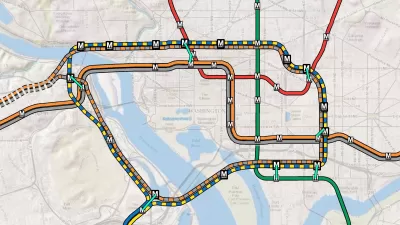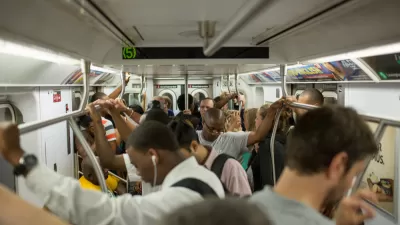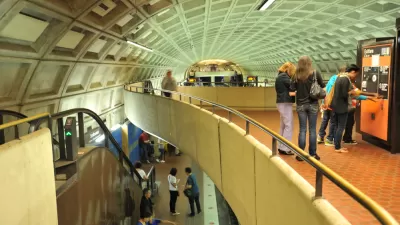While cities like New York and San Francisco's transit systems are bursting at the seams, D.C. Metro's rail system lost 5 percent of its ridership between 2010 and 2015. This week Metro acknowledged some of its fault in that trend.

"Metro, in an unusual acknowledgment, says breakdowns and other service failures appear to be contributing to a steady, years-long decline in ridership that is causing financial stress for the transit agency and could lead to fare increases," reports Paul Duggan.
The mea culpa, of sorts, comes from a revenue briefing provided by staff to Metro's governing board this week. In addition to high profile incidents that shut down service, such as smoke from an electrical line in a Yellow Line tunnel in January, supplement a track record of poor on-time performance. Interestingly, on-time performance has worsened since the Silver Line opened for service in July 2014.
According to Duggan, "Metrorail foul-ups are a daily norm. On Tuesday, for example, in addition to rush-hour slowdowns that are expected to last into next year on the Silver, Orange and Blue lines, there was a large-scale service disruption on the Blue and Yellow lines during the evening rush hour because of a problem on tracks shared by the lines between the National Airport and Braddock Road stations."
Any action to correct the performance of Metro will have to come under the watchful eye of the federal government. Keith Laing recently reported that the Federal Transit Administration approved a "correction action plan" for Metro in the wake of passenger safety incidents.
FULL STORY: Metro acknowledges breakdowns might be adding to a ridership decline

Maui's Vacation Rental Debate Turns Ugly
Verbal attacks, misinformation campaigns and fistfights plague a high-stakes debate to convert thousands of vacation rentals into long-term housing.

Planetizen Federal Action Tracker
A weekly monitor of how Trump’s orders and actions are impacting planners and planning in America.

Chicago’s Ghost Rails
Just beneath the surface of the modern city lie the remnants of its expansive early 20th-century streetcar system.

Bend, Oregon Zoning Reforms Prioritize Small-Scale Housing
The city altered its zoning code to allow multi-family housing and eliminated parking mandates citywide.

Amtrak Cutting Jobs, Funding to High-Speed Rail
The agency plans to cut 10 percent of its workforce and has confirmed it will not fund new high-speed rail projects.

LA Denies Basic Services to Unhoused Residents
The city has repeatedly failed to respond to requests for trash pickup at encampment sites, and eliminated a program that provided mobile showers and toilets.
Urban Design for Planners 1: Software Tools
This six-course series explores essential urban design concepts using open source software and equips planners with the tools they need to participate fully in the urban design process.
Planning for Universal Design
Learn the tools for implementing Universal Design in planning regulations.
planning NEXT
Appalachian Highlands Housing Partners
Mpact (founded as Rail~Volution)
City of Camden Redevelopment Agency
City of Astoria
City of Portland
City of Laramie





























